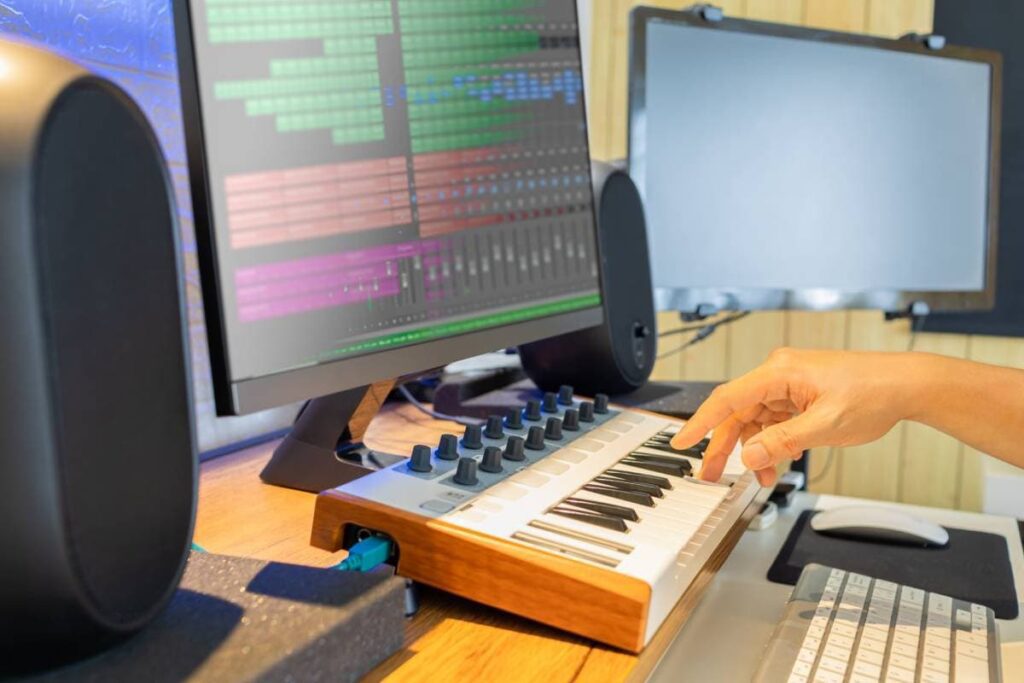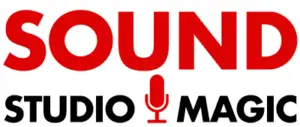If you’re a musician with a home recording studio, you probably use DAWs (digital audio workstations) for recording, mixing, and editing professional music. Although there are several DAWs, many of them have similar functions. But does that means they’re all essentially the same?
Although not all DAWs are the same, they mostly have the same purpose. When recording music at home, you need to account for the genre, how and what you will record, what hardware you have, etc. Also, if you are a beginner, you should choose a DAW with no steep learning curve.
Read on to learn more about what you need to know about DAWs and their small differences.
Table of Contents
- Considerations When Choosing a Digital Audio Workstation (DAW)
- Best DAWs for Professional Home Recorders
- Bottom Line

Considerations When Choosing a Digital Audio Workstation (DAW)
Each specific DAW has its advantages and disadvantages, and I’ll review them to help you narrow down your choice to the best one for you.
Although choosing a DAW sounds difficult, the point of a DAW is music production, and you shouldn’t spend all your time trying out one DAW after another when all you really want is to be the musical artist you’re meant to be.
Before you choose a DAW, here are the questions you may want to answer first.
Which Operating System Will You Use?
When DAWs first became available, most producers and composers used Macs because they were faster and more versatile than PCs. Fortunately for PC users, that’s no longer the case.
Most DAWs can operate on either PCs or Macs. However, a few are exclusive to one operating system. For example, Sonar Cakewalk only works on Windows, while Logic Pro X only works on Mac.
If you often collaborate with others, or you don’t want to go through the trouble of changing operating systems, a DAW that installs on both Mac and PC can give you more flexibility.
How Much Music Production Software Have You Used?
A DAW should make it easier to make music. It makes no sense to invest in a DAW as complex as Pro Tools or Reason if you’ve never used a DAW.
For example, if you don’t have a solid understanding of a concept like complex channel routing, you should start with a DAW that’s easier to mix and master.
For Mac users, GarageBand usually comes free with your computer. It’s an excellent starter DAW, and it may be enough for your home recording needs. Also, GarageBand users often transition more easily to more sophisticated DAWs like Logic Pro.
Ultimately, the best DAW gets out of the way of making music and lets you concentrate on what you can do best as a home recording artist; make your own sound.
As for PC users, PL Studio is often mentioned as a good DAW for beginners because its layout is logical and easy to use. EDM and hip-hop artists tend to favor PL Studio, though it’s suitable for most genres.
Audacity is another beginner-friendly DAW. Although it doesn’t let you record MIDI files, it does allow you to import them. So if you don’t want a steep learning curve and want to try your hand at loop-based music, consider Audacity.
What Kind of Music Will You Create?
As the last section hinted, the kind of music you want to make plays a role in the DAW you choose. For example, Audacity works well for singer-songwriters who want to combine vocal and instrumental tracks. However, if you need a sample-based drum machine, try out Akai MPC Beats.
Let’s review all the different DAWs.
Best DAWs for Professional Home Recorders
Say you’ve tried your hand at the DAWs I mentioned above, and you believe you need more sophisticated features or more features in general. In that case, the following are some of the major DAWs with different features that you may want to consider. Are all DAWs same?
Avid Pro Tools
Pro Tools is the go-to tool for recording live bands, audio post-production, and multiple tracks.
One of the earliest DAWs ever created, it has become one of the most commonly used digital workstations. Due to its superior recording, composing, editing, and mixing capabilities, it’s considered the industry standard for professional post-production in films and television.
It works on both PCs and Macs and comes in three versions — Artist, Studio, and Flex. Beginners should start with Pro Tools Artist, which you can download here.
Ableton Live
Ableton Live is the best DAW available if you want to create electronic music and use a DAW in live performances.
It works on both PCs and Macs and provides simple tools for making sounds and music. In addition, if your goal is to compose music in a DAW, Ableton Live excels at that because of the variety of instruments and effects it contains.
You can mix and modify effects and instruments to make your own sound and textures. You can also adjust settings in real-time with the macro knobs in Ableton Live.
A “session view” for live concerts is provided, which allows you to change tracks and sample them in real-time. Deejaying, live composing, and similar techniques are easier on Ableton Live as well.
Ableton Live is perfect for creating rhythms, beat patterns, and loops, especially in the house, dubstep, and electronic genres.
Ableton’s Live 11 Suite and Standard can be expensive, but the Intro version is more reasonably priced and has most of the features a beginner needs. Start with the free download version to understand how it works.
Logic Pro
Logic Pro excels at integrating MIDI keyboards and controllers, tracking, composition, and overall music production. But unfortunately, Logic Pro is a Mac-only program. This is a shame since it has all the audio effects and recording features required to create whole songs from scratch.
The program includes a vast library of Apple Loops, which makes the program popular with many music producers.
In addition, you can easily use MIDI with Logic Pro (which you can’t do for programs like Pro Tools). All you have to do is connect a controller or keyboard, then use the wide range of integrated virtual instruments to express your creativity.
Not only is composing music simple with Logic Pro, but you can also import videos. Also, the music notation component will help you organize and plan your music-making.
FL Studio
FL Studio allows you to record, edit, and produce music. FL Studio is a very versatile DAW that can be used for various genres, including hip-hop, EDM, pop, and rock. FL Studio has a wide range of features that make it an ideal DAW for producing music.
FL Studio is easy-to-learn software, has a large user base, and makes producing beats easy.
Some of the key features of FL Studio include:
- A user-friendly interface that makes it easy to use for both beginners and advanced users
- A powerful piano roll editor that allows you to create complex melodies and rhythms
- A wide range of built-in instruments and built-in plugins give you a huge amount of sound design options from this software.
- Flexible audio editing and mixing options for each audio track
- Advanced MIDI features that allow you to create very realistic-sounding music
Overall, FL Studio is a very powerful and versatile DAW that is perfect for producing all kinds of music. If you are looking for a DAW to produce your next album or EP, then FL Studio should be at the top of your list.
Other certain DAWs to look into include:
- Presonus Studio One, with its drag and drop, tons of plugins, and easy mixing
- Cockos Reaper, an excellent low-budget DAW that is highly customizable and relatively easy to use
- Audacity, although Audacity is not technically a DAW, can be a great low-budget option that can do many things a proper DAW can do.
Bottom Line
On the one hand, all DAWs have a similar purpose, but some are better suited for recording and mixing live music sound quality, while DJs and musicians prefer other DAWs when working with electronic music. Not all DAWs sound the same for that matter.
Either way, the goal is to make a great-sounding audio file with one program that allows for all your different creative decisions.
Ultimately, the best DAW gets out of the way of making music and lets you concentrate on what you can do best as a home recording artist; make your own sound.
- Review of the ALABS IRON MINI-WL: A Powerhouse Wireless Microphone - October 4, 2023
- What is a Saturator in Music Production: A Brief Explanation - May 11, 2023
- What Are Rotary DJ Mixers? An Overview - May 11, 2023
SoundStudiomagic.com is a participant in the Amazon Services LLC Associates Program, an affiliate advertising program designed to provide a means for sites to earn advertising fees by advertising and linking to Amazon.com. We also participate in other affiliate programs which compensate us for referring traffic.

